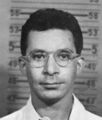Template:Selected anniversaries/May 21: Difference between revisions
No edit summary |
No edit summary |
||
| Line 52: | Line 52: | ||
||1951 – The opening of the Ninth Street Show, otherwise known as the 9th Street Art Exhibition: A gathering of a number of notable artists, and the stepping-out of the post war New York avant-garde, collectively known as the New York School. | ||1951 – The opening of the Ninth Street Show, otherwise known as the 9th Street Art Exhibition: A gathering of a number of notable artists, and the stepping-out of the post war New York avant-garde, collectively known as the New York School. | ||
File:Ernst Zermelo 1900s.jpg|link=Ernst Zermelo (nonfiction)|1953: Logician and mathematician [[Ernst Zermelo (nonfiction)|Ernst Friedrich Ferdinand Zermelo]] dies. His work had major implications for the foundations of mathematics; he is known for his role in developing Zermelo–Fraenkel axiomatic set theory, and for his proof of the well-ordering theorem. | |||
||1964 – James Franck, German physicist and academic, Nobel Prize laureate (b. 1882) | ||1964 – James Franck, German physicist and academic, Nobel Prize laureate (b. 1882) | ||
Revision as of 18:08, 21 November 2017
1471: Painter, engraver, and mathematician Albrecht Dürer born. He will introduction of classical motifs into Northern art through his knowledge of Italian artists and German humanists.
1670: Astronomer and physicist Niccolò Zucchi dies. He published works on astronomy, optics, mechanics, and magnetism.
1923: Mathematician and academic Armand Borel born. He will work in algebraic topology, and in the theory of Lie groups. He will contribute to the creation of the contemporary theory of linear algebraic groups.
1932: Bad weather forces aviator Amelia Earhart to land in a pasture in Derry, Northern Ireland, after flying solo across the Atlantic Ocean.
1946: Physicist Louis Slotin is fatally irradiated in a criticality incident during an experiment with the demon core at Los Alamos National Laboratory.
1953: Logician and mathematician Ernst Friedrich Ferdinand Zermelo dies. His work had major implications for the foundations of mathematics; he is known for his role in developing Zermelo–Fraenkel axiomatic set theory, and for his proof of the well-ordering theorem.





